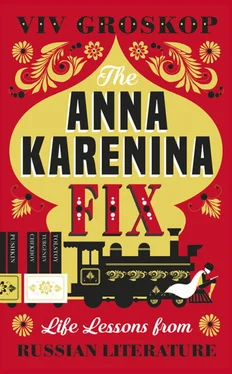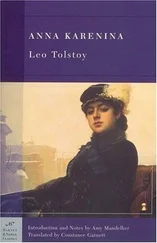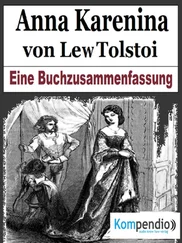Viv Groskop - The Anna Karenina Fix - Life Lessons from Russian Literature
Здесь есть возможность читать онлайн «Viv Groskop - The Anna Karenina Fix - Life Lessons from Russian Literature» весь текст электронной книги совершенно бесплатно (целиком полную версию без сокращений). В некоторых случаях можно слушать аудио, скачать через торрент в формате fb2 и присутствует краткое содержание. Город: London, Год выпуска: 2017, ISBN: 2017, Издательство: Fig Tree, Жанр: Публицистика, Критика, на английском языке. Описание произведения, (предисловие) а так же отзывы посетителей доступны на портале библиотеки ЛибКат.
- Название:The Anna Karenina Fix: Life Lessons from Russian Literature
- Автор:
- Издательство:Fig Tree
- Жанр:
- Год:2017
- Город:London
- ISBN:978-0-241-98126-9
- Рейтинг книги:3 / 5. Голосов: 1
-
Избранное:Добавить в избранное
- Отзывы:
-
Ваша оценка:
- 60
- 1
- 2
- 3
- 4
- 5
The Anna Karenina Fix: Life Lessons from Russian Literature: краткое содержание, описание и аннотация
Предлагаем к чтению аннотацию, описание, краткое содержание или предисловие (зависит от того, что написал сам автор книги «The Anna Karenina Fix: Life Lessons from Russian Literature»). Если вы не нашли необходимую информацию о книге — напишите в комментариях, мы постараемся отыскать её.
‘A passionate, hilarious, joyful love letter to Russian literature’ Allison Pearson, Sunday Telegraph
‘A delightful primer and companion to all the authors you are ashamed to admit you haven’t read’ The Times
The Anna Karenina Fix: Life Lessons from Russian Literature — читать онлайн бесплатно полную книгу (весь текст) целиком
Ниже представлен текст книги, разбитый по страницам. Система сохранения места последней прочитанной страницы, позволяет с удобством читать онлайн бесплатно книгу «The Anna Karenina Fix: Life Lessons from Russian Literature», без необходимости каждый раз заново искать на чём Вы остановились. Поставьте закладку, и сможете в любой момент перейти на страницу, на которой закончили чтение.
Интервал:
Закладка:
All ‘Ivanovich’ is doing is telling you the name of that person’s father. Let’s say this person is called (and it is entirely plausible) Ivan Ivanovich Ivanov. That means, in Western terms, his name is Ivan Ivanov (Christian name and surname). The ‘Ivanovich’ bit can more or less be overlooked: it just means that his father’s name was also Ivan. Literally, it means: John, Son of John, Of the John Family. In Russian, though, you would never ignore the Ivanovich bit, as it is used as a mark of respect. Instead of saying, ‘Hello, Mr Ivanov,’ which is what we might say in English to convey respect (instead of saying, ‘Hello, Ivan’), Russians would say, ‘Hello, Ivan Ivanovich.’ (‘Hello, John, Son of John.’) The words for ‘sir’ and ‘Mister’, ‘Miss’ and ‘Mrs’ are not commonly used in Russian. They don’t need them, because they have the patronymic. It’s actually much nicer. (Although quite stressful if you cannot remember someone’s patronymic. And by the time you have figured out how to ask subtly, ‘By the way, what was your father’s name?’, you will already have been rude by not addressing them by name, which is a bad thing to do in Russian.)
For women, the rules are the same (the patronymic still refers to their father), only their patronymic will end in, for example, ‘–evna’ or ‘–ovna’ instead of ‘–evich’ or ‘–ovich’. ‘Anna Ivanovna Ivanova.’ (Anna, Daughter of John, Of the John Family.) The surname is also changed, to reflect that it’s a woman’s name. Naturally, this would not be Russian if everyone agreed with this system. So, some people when they are translating from Russian into English do not preserve the difference between the male and female surname. In the edition I’ve used here, Anna Karenina is Anna Karenina (her patronymic is Arkadyevna because her father’s name is Arkady) and her husband is Karenin, with no ‘a’. (He is Alexei Alexandrovich, as his father is Alexander. Isn’t this fun, guys?)
Some people (let’s call them pedants, because that’s what they are) get so overexcited about this business of names and transliteration that they fuse the two and become ultra-pernickety. Nabokov, for example, was legendarily testy on this question and refused to accept the idea that it was normal in English to say ‘Anna Karenina’. He, without exception, referred to the novel as ‘Anna Karenin’. Amusingly, his wife did not agree with his system and always called herself ‘Vera Nabokova’. I would like to have been a fly on the wall of the suite of their luxury Swiss hotel when they were discussing this point of difference.
To be fair, it is really easy to see why people get intimidated by all things Russian when you have all this to contend with before you have even started reading a novel. Plus, the patronymic thing is just the beginning. I know what the Danish academic would say now. ‘Why, then, is Ivan Ivanovich Ivanov sometimes called Vanya? Is his name Ivan? Or is his name Vanya? Why can’t they make up their minds?’ ‘Vanya’ is the diminutive of Ivan. (Like ‘Johnny’ for John.) But then, of course, you get into the endearments for Ivan: Vanyusha, Vanechka, Vanyushechka, Vanyushka, Ivanyushka… (I promise I’m not making this up.) And if you want to be mean, vulgar or jokey, the pejoratives: Vanka, Ivashka. So that’s already eleven names for one person. It’s not forty-seven, but it’s still a lot. Also, every name has these possibilities. For Anna, for example, you could have any of these: Anya, Annochka, Anechka, Nyura, Annushka, Annusha, Annyusya, Anyusha, Annyunya, Nyunya, Nyuta, Anyusya… And this doesn’t even take into consideration the really silly ones that your family members could make up for fun.
I understand why this is annoying and confusing. I have studied Russian for over two decades, and I still encounter diminutives and can’t figure out what name they come from. How you make Olga into Lyolya or Lyalya is beyond me but, apparently, you do. Dimitry becomes Dima or Mitya or many other things. For Vladimir: Volodya, Vova, Vovochka, Vladik… It goes on. I have concluded that it is best not to get hung up on these things and to muddle through as best you can.
The Holy Grail of Russian-speaking is getting so good at it that you feel comfortable making up your own diminutives and still manage to sound authentic. This is how some Russian-speaking friends have ended up calling me mad things like Vivushka and Vivinka. If you’re ever lucky enough to be christened with a name like this, my advice is that it’s best not to fight it. Equally, if you’re encountering names you don’t recognize in a Russian novel and it is driving you crazy and making you scream, ‘Who the hell is Kolya?’ (it’s from ‘Nikolai’ – see also: Kolyenka, Kolka, Kolyan, Lado, Nika, Nikolasha, Nikolenka, Nikolka, Nikusya…), try and channel the advice Tolstoy gives in his Calendar of Wisdom on 21 October: ‘You can’t always remain calm, but whenever there are times of peace and calm in your life, you need to value them and try to prolong them.’ In other words: don’t sweat the diminutives.
One small mercy in Russian literature is that you rarely get the sort of name you hear a lot in everyday spoken Russian. One lovely thing people do when calling names out in everyday life is to give up on all these things completely and just use the first syllable of the name. So, for Alexandra (Sasha), they will just say ‘Sash’. For Ivan (Vanya), ‘Van’. This is much more like Dave and Bob and Pete. Really, they are just like us. No, really they are. They just have more names for each other.
Introduction
‘I took a speed-reading course and read War and Peace in twenty minutes. It involves Russia.’
Woody AllenAn enemy of baked goods of all kinds, Tolstoy was not one of those insufferable people who breeze through life unencumbered by frustration and angst. Comfortingly enough, he was a person who struggled to understand why, at times, life felt intensely painful, even when nothing that bad was happening. His empathy for the pain of the human condition is surprising in some ways, because he lived a monastic existence and indulged in few, if any, pleasures. Unlike the rest of us, he really had very little to feel bad about. Tolstoy was very much not a doughnuts-and-beer kind of guy. He only ate cake if it was a family birthday, and then it had to be a particular cake, his wife’s Anke pie, a sour lemon tart named after a family doctor. Mostly, he ate simply and repetitively. One of the researchers at the Tolstoy Museum at his estate in Yasnaya Polyana recently uncovered evidence of his fifteen favourite egg dishes, which he ate in rotation. These included scrambled eggs with dill, and peas with eggs. He didn’t drink alcohol. He didn’t eat meat. And yet still he frequently felt that he was a terrible person.
Perhaps as a result of this tortured way of thinking, long before self-help manuals became hugely popular in the early twentieth century, Tolstoy had already written one of his own. It was full of the sort of inspirational quotes we’re now used to seeing on fridge magnets and as advertisements for mindfulness retreats. Some of the sayings are his own quotes:
We only truly come alive in ourselves when we live for others.
If a rich man is to be truly charitable, he will give away all his wealth as soon as possible.
In itself, work is not a virtue, but it is an essential condition of a virtuous life.
The other sayings are from writers and thinkers who inspired him: Rousseau, Plutarch, Pascal, Epictetus, Marcus Aurelius, Emerson, John Ruskin and Henry David Thoreau among others, as well as quotations from the Talmud and the Bible. In Tolstoy’s defence, A Calendar of Wisdom was deeply serious and well meant. The book itself is calming, fascinating and often unintentionally entertaining: ‘If you are in the grip of carnal passions and overwhelmed by them, you will become entwined in the creeping bindweed of suffering’ – Buddhist wisdom. (Bring on the carnal passions, I say. Worry about the bindweed later.) Also known as A Circle of Readings or The Thoughts of Wise People , A Calendar of Wisdom consisted of a page of inspiring quotes for each day of the year, collected by Tolstoy over sixteen years and a popular edition was published in 1912, two years after his death.
Читать дальшеИнтервал:
Закладка:
Похожие книги на «The Anna Karenina Fix: Life Lessons from Russian Literature»
Представляем Вашему вниманию похожие книги на «The Anna Karenina Fix: Life Lessons from Russian Literature» списком для выбора. Мы отобрали схожую по названию и смыслу литературу в надежде предоставить читателям больше вариантов отыскать новые, интересные, ещё непрочитанные произведения.
Обсуждение, отзывы о книге «The Anna Karenina Fix: Life Lessons from Russian Literature» и просто собственные мнения читателей. Оставьте ваши комментарии, напишите, что Вы думаете о произведении, его смысле или главных героях. Укажите что конкретно понравилось, а что нет, и почему Вы так считаете.












